What is Xyrem?
Xyrem is a prescription medicine used to treat the following symptoms in people 7 years of age or older with narcolepsy:
- sudden onset of weak or paralyzed muscles (cataplexy)
- excessive daytime sleepiness (EDS)
It is not known if Xyrem is safe and effective in children less than 7 years of age.
What is the most important information I should know about Xyrem?
- Xyrem is a central nervous system (CNS) depressant. Taking Xyrem with other CNS depressants such as medicines used to make you or your child fall asleep, including opioid analgesics, benzodiazepines, sedating antidepressants, antipsychotics, sedating anti-epileptic medicines, general anesthetics, muscle relaxants, alcohol, or street drugs, may cause serious medical problems, including:
- trouble breathing (respiratory depression)
- low blood pressure (hypotension)
- changes in alertness (drowsiness)
- fainting (syncope)
- death
Ask your doctor if you are not sure if you are, or your child is, taking a medicine listed above.
- Xyrem is a federal controlled substance (CIII). The active ingredient of Xyrem is a form of gamma-hydroxybutyrate (GHB) that is also a federal controlled substance (CI). Abuse of illegal GHB, either alone or with other CNS depressants may cause serious medical problems, including:
- seizure
- trouble breathing (respiratory depression)
- changes in alertness (drowsiness)
- coma
- death
Call your doctor right away if you or your child has any of these serious side effects.
- Anyone who takes Xyrem should not do anything that requires them to be fully awake or is dangerous, including driving a car, using heavy machinery, or flying an airplane, for at least 6 hours after taking Xyrem. Those activities should not be done until you know how Xyrem affects you or your child.
- Keep Xyrem in a safe place to prevent abuse and misuse. Selling or giving away Xyrem may harm others, and is against the law. Tell your doctor if you have ever abused or been dependent on alcohol, prescription medicines, or street drugs.
- Because of the risk of CNS depression, abuse, and misuse, Xyrem is available only by prescription, and filled through the central pharmacy in the Xywav and Xyrem REMS. You or your child must be enrolled in the Xywav and XREM REMS to receive Xyrem. For information on how to receive Xyrem visit WWW.XywavXyremREMS.COM. Before you receive or your child receives Xyrem, your doctor or pharmacist will make sure that you understand how to take Xyrem safely and effectively. If you have any questions about Xyrem, ask your doctor or call the Xywav and Xyrem REMS at 1-866-997-3688.
Who should not take Xyrem?
Do not take Xyrem if you or your child:
- takes other sleep medicines or sedatives (medicines that cause sleepiness)
- drinks alcohol
- has a rare problem called succinic semialdehyde dehydrogenase deficiency
What should I tell my healthcare provider before taking Xyrem?
Before taking Xyrem, tell your doctor about all medical conditions, including if you or your child:
- have a history of drug abuse
- have short periods of not breathing while sleeping (sleep apnea)
- has trouble breathing or has lung problems. You or your child may have a higher chance of having serious breathing problems when taking Xyrem.
- have or had depression or has tried to harm yourself or themselves. You or your child should be watched carefully for new symptoms of depression.
- has or had behavior or other psychiatric problems such as:
- anxiety
- feeling more suspicious (paranoia)
- acting aggressive
- seeing or hearing things that are not real (hallucinations)
- being out of touch with reality (psychosis)
- agitation
- have liver problems
- are on a salt-restricted diet. Xyrem contains a lot of sodium (salt) and may not be right for you or your child.
- have high blood pressure
- have heart failure
- have kidney problems
- are pregnant or plan to become pregnant. It is not known if Xyrem can harm your unborn baby.
- are breastfeeding or plan to breastfeed. Xyrem passes into breast milk. You and your doctor should decide if you or your child will take Xyrem or breastfeed.
Tell your doctor about all the medicines you take or your child takes, including prescription and over-the-counter medicines, vitamins, and herbal supplements.
Especially, tell your doctor if you take or your child takes other medicines to help you or your child sleep (sedatives). Know the medicines you take or your child takes. Keep a list of them to show your doctor and pharmacist when you get or your child gets a new medicine.
How should I take Xyrem?
- Read the Instructions for Use at the end of this Medication Guide for detailed instructions on how to take Xyrem.
- Take or give Xyrem exactly as your doctor tells you to take or give it.
- Xyrem can cause physical dependence and craving for the medicine when it is not taken as directed.
- Never change the Xyrem dose without talking to your doctor.
- Xyrem can cause sleep very quickly without feeling drowsy. Some patients fall asleep within 5 minutes and most fall asleep within 15 minutes. Some patients take less time to fall asleep and some take more time. The time it takes to fall asleep might be different from night to night.
- Falling asleep quickly, including while standing or while getting up from the bed, has led to falls with injuries that have required some people to be hospitalized.
- Xyrem is taken at night divided into 2 doses.
- Adults: Take the first Xyrem dose at bedtime while you are in bed and lie down immediately. Take the second Xyrem dose 2½ to 4 hours after the first Xyrem dose. You may want to set an alarm clock to make sure you wake up to take the second Xyrem dose. You should remain in bed after taking the first and second doses of Xyrem.
- Child: Give the first Xyrem dose at bedtime or after an initial period of sleep, while your child is in bed and have them lie down immediately. Give the second Xyrem dose 2½ to 4 hours after the first Xyrem dose. You may want to set an alarm clock to make sure you wake up to give the second Xyrem dose. Your child should remain in bed after taking the first and second doses of Xyrem.
- If you miss or your child misses the second Xyrem dose, skip that dose and do not take or give Xyrem again until the next night. Never take or give 2 Xyrem doses at 1 time.
- Wait at least 2 hours after eating before taking Xyrem.
- If you take or your child takes too much Xyrem, call your doctor or go to the nearest hospital emergency room right away.
What are the possible side effects of Xyrem?
Xyrem can cause serious side effects, including:
- See “What is the most important information I should know about Xyrem?”
- breathing problems, including:
- slower breathing
- trouble breathing
- short periods of not breathing while sleeping (sleep apnea). People who already have breathing or lung problems have a higher chance of having breathing problems when they use Xyrem.
- mental health problems, including:
- confusion
- seeing or hearing things that are not real (hallucinations)
- unusual or disturbing thoughts (abnormal thinking)
- feeling anxious or upset
- depression
- thoughts of killing yourself or trying to kill yourself
- increased tiredness
- feelings of guilt or worthlessness
- difficulty concentrating
Call your doctor right away if you have or your child has symptoms of mental health problems or a change in weight or appetite.
- sleepwalking. Sleepwalking can cause injuries. Call your doctor if you start or your child starts sleepwalking. Your doctor should check you or your child.
The most common side effects of Xyrem in adults include:
- nausea
- sleepiness
- dizziness
- vomiting
- bedwetting
- tremor
The most common side effects of Xyrem in children include:
- nausea
- bedwetting
- vomiting
- headache
- weight decreased
- decreased appetite
- dizziness
- sleepwalking
Side effects may increase when taking higher doses of Xyrem.
These are not all the possible side effects of Xyrem. For more information, ask your doctor or pharmacist. Call your doctor for medical advice about side effects. You may report side effects to FDA at 1-800-FDA-1088.
General information about the safe and effective use of Xyrem
Medicines are sometimes prescribed for purposes other than those listed in a Medication Guide. Do not use Xyrem for a condition for which it was not prescribed. Do not give Xyrem to other people, even if they have the same symptoms. It may harm them.
You can ask your pharmacist or doctor for information about Xyrem that is written for health professionals.
How should I store Xyrem?
- Store Xyrem in the original bottle prior to mixing with water. After mixing with water, store Xyrem in pharmacy containers with child-resistant caps provided by the pharmacy.
- Store Xyrem at room temperature between 68°F to 77°F (20°C to 25°C).
- Xyrem solution prepared after mixing with water should be taken within 24 hours.
- When you have finished using a Xyrem bottle:
- empty any unused Xyrem down the sink drain
- cross out the label on the Xyrem bottle with a marker
- place the empty Xyrem bottle in the trash
Xyrem comes in a child-resistant package. Keep Xyrem and all medicines out of the reach of children and pets.
What are the ingredients in Xyrem?
Active ingredients: sodium oxybate
Inactive ingredients: purified water and malic acid
For more information, go to WWW.XYWAVXYREMREMS.COM or call the Xywav and Xyrem REMS at 1-866-997-3688.
Instructions for use for Xyrem
Xyrem (ZĪE-rem)
(sodium oxybate)
oral solution, CIII
Read this Instructions for Use carefully before you (or your child) start taking Xyrem and each time you (or your child) get a refill. There may be new information. This information does not take the place of talking to your doctor about your (or your child’s) medical condition or treatment.
Important Information:
- You will need to split your (or your child’s) prescribed Xyrem dose into 2 separate pharmacy containers for mixing.
- You will need to mix Xyrem with water before you take or give your child the dose.
- Safely store the prepared Xyrem doses and take within 24 hours after mixing. If the prepared dose was not taken within this time, throw the mixture away. See “Throwing away (disposing of) XYRM” section below for instructions about how to safely throw away Xyrem.
- Both Xyrem doses should be taken while in bed.
- The pharmacy containers may be rinsed out with water and emptied into the sink drain.
Supplies you will need for mixing and taking (or giving your child) Xyrem. See Figure A:
- Bottle of Xyrem medicine
- Dosing syringe for measuring and dispensing the Xyrem dose
- Measuring cup that is able to measure about ¼ cup of water (not provided with the Xyrem shipment)
- 2 empty pharmacy containers with child-resistant caps for mixing, storing, and taking the Xyrem doses
- Alarm clock (not pictured which may be included in the first shipment)
- Medication Guide
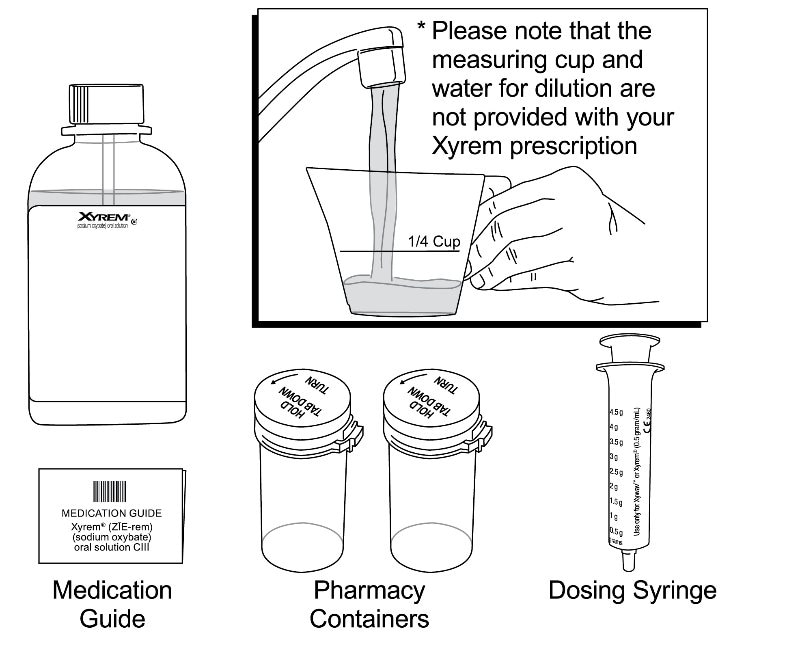
Figure A
Step 1: Setup
- Take the Xyrem bottle, syringe, and pharmacy containers out of the shipping box.
- Take the syringe out of the plastic wrapper. Use only the syringe provided with the Xyrem prescription.
- Fill a measuring cup (not provided) with about ¼ cup of water available for mixing your dose.
- Make sure the pharmacy containers are empty.
- Open both pharmacy containers by holding the tab under the cap and turning counterclockwise (to the left). See Figure B.
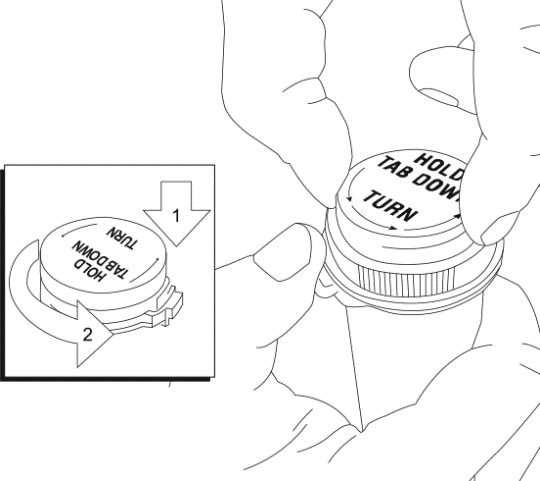
Figure B
Remove the tamper evident band by pulling at the perforations and then remove the bottle cap from the Xyrem bottle by pushing down while turning the cap counterclockwise. See Figure C.
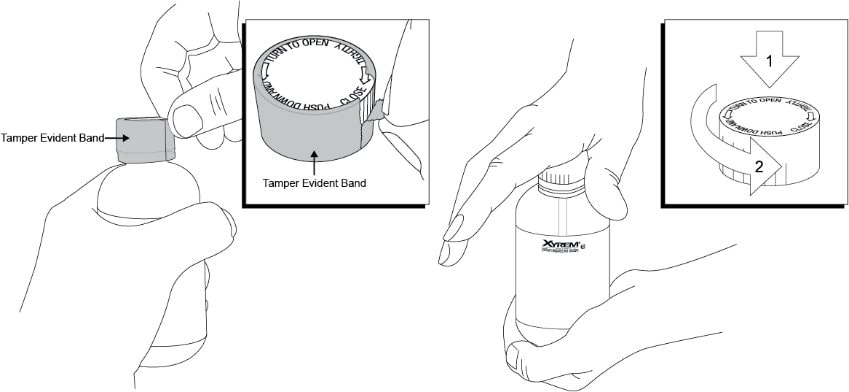
Figure C
Step 2. Prepare the first Xyrem dose (prepare before bedtime)
Place the Xyrem bottle on a hard, flat surface and grip the bottle with one hand and firmly press the syringe into the center opening of the bottle with the other hand. See Figure D.
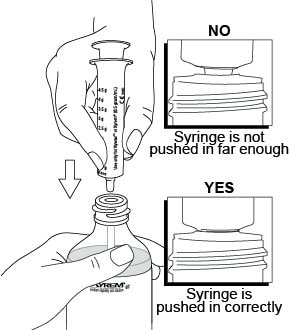
Figure D
Pull back on the plunger until the medicine flows into the syringe and the liquid level is lined up with the marking on the syringe that matches you or your child’s dose. See Figure E.
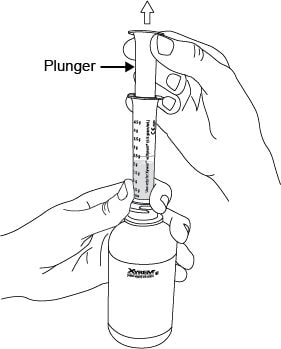
Figure E
Note: The Xyrem medicine will not flow into the syringe unless you keep the bottle upright.
Figure F shows an example of drawing up a Xyrem dose of 2.25 g. Figure G shows an example if an air space forms when drawing up the dose.
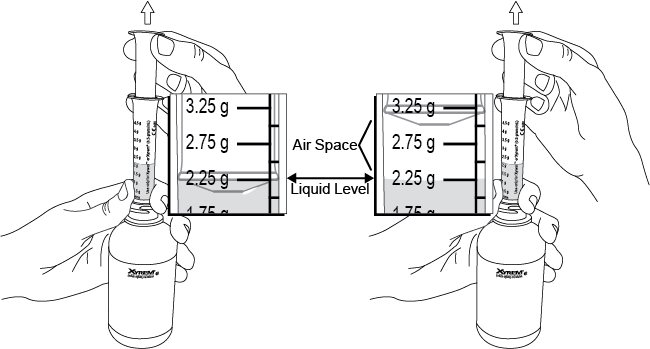
Figure F Figure G
Note: If an air space forms between the plunger and the liquid when drawing up the medicine, line up the liquid level with the marking on the syringe that matches your or your child’s dose. See Figure G above.
- After you draw up the first divided Xyrem dose, remove the syringe from the opening of the Xyrem bottle.
- Empty all of the medicine from the syringe into one of the provided empty pharmacy containers by pushing down on the plunger until it stops. See Figure H.
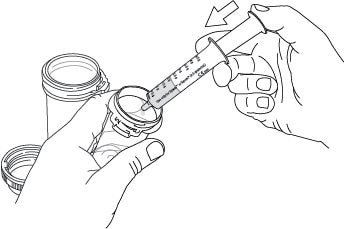
Figure H
- Using a measuring cup, pour about ¼ cup of water into the pharmacy container. Be careful to add only water to the pharmacy container and not more Xyrem.
- All shipped bottles of Xyrem contain the concentrated medicine. Water for mixing the medicine is not provided in the shipment.
- Place the child-resistant cap provided on the filled pharmacy container on the pharmacy container and turn the cap clockwise (to the right) until it clicks and locks into its child-resistant position. See Figure I.
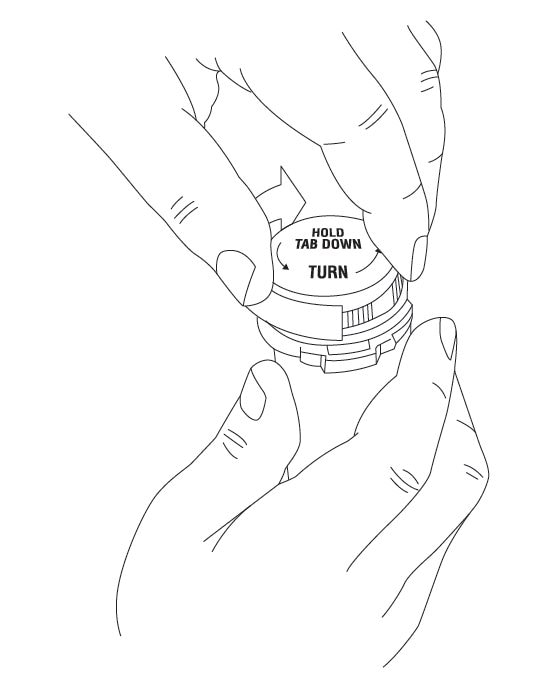
Figure I
Step 3. Prepare the second Xyrem dose (prepare before bedtime)
- Repeat Step 2 drawing up the amount of medicine prescribed for your (or your child’s) second dose:
- emptying the syringe into the second pharmacy container
- adding about ¼ cup of water and
- closing the pharmacy container
Step 4. Store the prepared Xyrem doses
- Put the cap back on the Xyrem bottle and store the Xyrem bottle and both prepared doses in a safe and secure place. Store in a locked place if needed.
- Keep the Xyrem bottle and both prepared Xyrem doses out of the reach of children and pets.
- Rinse the syringe out with water and squirt the liquid into the sink drain by pushing down on the plunger until it stops.
Step 5. Take or give the first Xyrem dose
- At bedtime, and before you take (or give) the first Xyrem dose, put the second Xyrem dose in a safe place. Caregivers should make sure all Xyrem doses are kept in a safe place until given. You may want to set an alarm clock for 2½ to 4 hours later to make sure you wake up to take (or give) the second dose.
- When it is time to take (or give) the first Xyrem dose, remove the cap from the pharmacy container by pressing down on the child-resistant locking tab and turning the cap counterclockwise.
- Drink (or have your child drink) all of the first Xyrem dose while sitting in bed. Put the cap back on the first pharmacy container and immediately lie down to sleep (or have your child lie down to sleep).
- You (or your child) should fall asleep soon. Some people fall asleep within 5 minutes and most fall asleep within 15 minutes. Some patients take less time to fall asleep, and some take more time. The time it takes you (or your child) to fall asleep might be different from night to night.
Step 6. Take or give the second Xyrem dose
- When you wake up 2½ to 4 hours later for your (or your child’s) second dose of Xyrem, take the cap off the second pharmacy container.
- If you (or your child) wake up before the alarm and it has been at least 2½ hours since the first Xyrem dose, turn off the alarm and take (or give your child) the second Xyrem dose.
- Drink (or have your child drink) all of the second Xyrem dose while sitting in bed. Put the cap back on the second pharmacy container and immediately lie down (or have your child lie down) to continue sleeping.
How should I store Xyrem?
- Store Xyrem in the original bottle prior to mixing with water. After mixing, store Xyrem in the pharmacy containers provided by the pharmacy. The caps on the original bottle and pharmacy containers are child-resistant.
- Store Xyrem at room temperature between 68°F to 77°F (20°C to 25°C).
- Xyrem solution prepared after mixing with water should be taken within 24 hours or emptied down the sink drain.
Throwing away (disposing of) Xyrem
- When you have finished using a Xyrem bottle:
- empty any unused Xyrem down the sink drain
- cross out the label on the Xyrem bottle with a marker (not provided with the Xyrem shipment)
- place the empty Xyrem bottle in the trash
- Keep Xyrem and all medicines out of the reach of children and pets.
Instructions for use approved 7/2020

